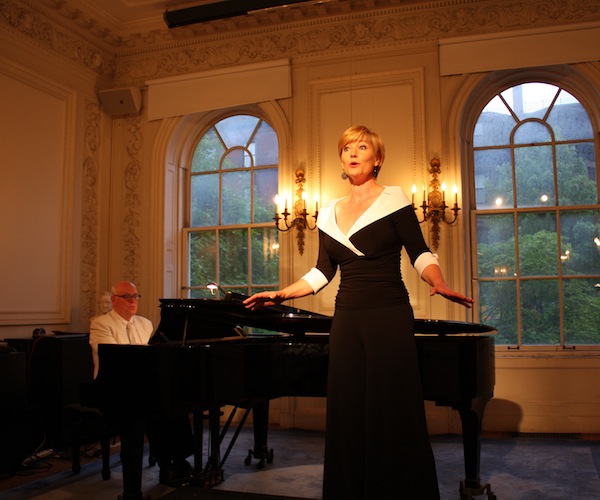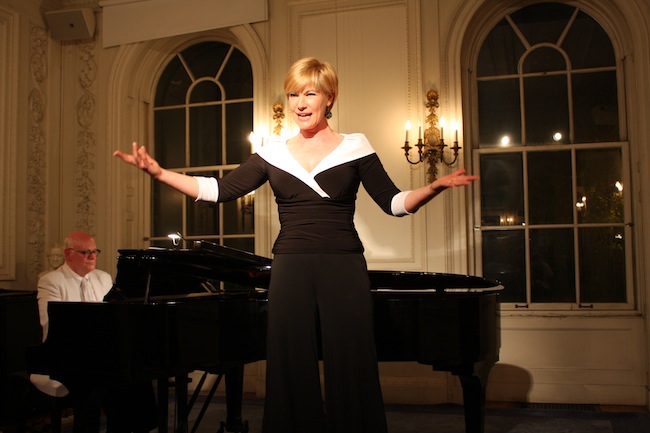Concert Review: Singer Ute Gfrerer at Goethe Institut — An Evening of Uncommon Grace
Singer Ute Gfrerer’s name should be spread far and wide to anyone — Jewish or not — who is interested in the music of that period, for this is first-rate work that should be heard for generations to come.

Singer Ute Gfrerer and pianist William Merrill — her command of her material, as well as her respect and love for it, made for an unforgettable evening. Photo: Alexandra Leppert.
By Roberta Silman
The finale of the series “What is German” at the Goethe Institut, developed by the renowned Harvard-MIT professor Susanne Klingenstein, was a concert called Paths of Life, a recital by Ute Gfrerer of the songs and stories of Jewish composers from Germany and Austria who fled from the Nazis. And what a finale it was!
Gfrerer is a wonderful singer with good credentials from opera houses in Zurich, London, Frankfort, Cologne, as well as the Vienna Volksoper, where she was a regular. But she also has a restless intelligence that has propelled her into a career that she finds “more interesting,” immersing herself in songs that “deserve to be better known.” And, of course, she is right. With rigor and determination she has discovered some profoundly beautiful songs, and her command of her material, as well as her respect and love for it made for an unforgettable evening. With her equally talented accompanist, William Merrill, and with Professor Klingenstein offering comments on the lives of the composers, Ute Gfrerer created a concert whose music illuminated its historical context with uncommon grace.
Ute (she prefers to be called Ute, I learned in our conversation later) started with Kurt Weill, whose humorous Le Grand Lustucru (the great bogeyman) could be taken on many levels and after hearing it, I was not so surprised to learn (which I never had before) that Weill had studied with Humperdinck. And although she also included the moving J’attends en navire — I’m Waiting for a Ship and “What did the soldier’s wife receive from Prague?” also by Weill, the rest of the first half of the program was dominated by the music of Norbert Glanzberg, who lived from 1910 until 2001. Born in Poland, Glanzberg composed popular songs in Germany, but as soon as he was declared “a degenerate artist” by Goebbels he went in exile to Paris; there he wrote for Edith Piaf (“Padam, Padam”), Charles Trenet, and Maurice Chevalier. He was active into the 1980s. The lyrics were written by Brecht, Munzinger (who was part of the German Resistance and died in the spring of 1945), Ilse Weber and G. Spiess. Glanzberg’s music sensitively evokes the poignant combination of melancholia and nostalgia that mark so many of these pieces, e.g. the one about the little suitcase who has lost his owner who “wore a star and was old and blind and treated me well, as if I was his child.” Or the witty bite in “Transport” and Die Ballade der Judenhure Marie Sanders. But what made these Glanzberg songs so powerful was Ute’s singing, the way her voice and her demeanor endowed each phrase with a depth difficult to describe but remarkable to watch and hear. As she rightly said, recognizing the pain implicit in many of the lyrics, “You may not want to clap after some of these songs, and please don’t feel you have to.”
The second part was dominated by the music of Hermann Leopoldi whose family name was changed from Kohn in the second half of the 19th century. He was actually sent to Dachau and Buchenwald and wrote an anthem to the camp called Buchenwaldermarsch; submitted by a friendly capo, it won a prize though Leopoldi never received the prize money. He was one of the very few lucky ones whose relatives were able to buy his freedom from the camp. Ute’s rendition of this anthem filled with hope had an uncanny beauty, especially the lines written by his fellow inmate in Dachau, Löhner-Beda, who ultimately died in the camps:
O Buchenwald, I cannot e’er forget you,
for you’re my destiny.
Who left you can but begin’ to fathom
how wonderful freedom is!
O Buchenwald we’ll not lament and sorrow
and what our future ever be
we would despite it all say “yes” to life,
for sure the day will come when we are free!
Leopoldi went on to write many more songs and became well-known for his ownership of and performances at The Viennese Lantern, a cafe that was regarded as a little piece of Vienna in Manhattan during the 1950’s. Immensely talented, he composed many songs for classical recitals as well as cabarets.
For the next song Ute returned to Glanzberg’s haunting music set to the unknown text, Der Alte Baum, and that became, for me, the most memorable part of the evening. Until that point Ute had let Professor Klingenstein do most of the talking, but when she looked straight at the audience and said she needed to tell us a little of her personal history, you could see everyone sit straighter. What she essentially told us was this: She was born in a small town in Austria (actually in Karinthia, I later learned) and when she was about twelve she realized that her father, who was born in 1926, had fought for the Nazis. By then she had some knowledge of the Holocaust and she couldn’t fathom how he could not have deep remorse and shame. But he had come back to a broken Germany and seemed unrepentant about the war and more concerned with the beating the Axis powers had taken. Thus, Ute and her father had many fights. But when she came upon Der Alte Baum, she felt she had found a metaphor for her troubled homeland, which must bear the eternal burden of blame. As she sang the song, especially the last stanza which follows, she seemed to be assuming the guilt for an entire nation. The words and notes came from the depths of her soul and were as poignant an apology as I have ever heard from a non-Jew for the Holocaust. Here it is:
Your trunk is deaf, and your bark dead
No leaf is growing, your branches are breaking,
Like a ghost you stand in the morning light.
Destroyed from all the poisonous rain
You stand there as a witness of our blame!
It was so good under your green shadow–
It seems to me, my friend,
As if I am dying with you!
After that and the strangely hopeful “All the Birds in Captivity,” with music by Glanzberg and lyrics by Johanna Kirchner, who was a Resistance fighter and left behind two daughters, Ute turned to a witty and charming confection by Leopoldi: “The Novaks of Prague.” For her last two songs she introduced us to the work of Josef Beer, whose comic operettas were well known before the war. Although he lived until 1987 he became more and more reclusive. Yet he was composing all that time and now there is a slow, yet determined resurgence of his work all over the world. Ute sang two arias from “Polish Wedding” with great panache, ending the evening on an entertaining note.
Her diligence in finding the evening’s songs and then performing them so well is an achievement that deserves to be heard by larger gatherings than the almost 200 who attended her concert at Goethe Institut. Her name should be spread far and wide to anyone — Jewish or not — who is interested in the music of that period, for this is first-rate work that should be heard for generations to come. One of the most pressing questions we have been asking ourselves since that terrible time is: How much talent was destroyed by the perpetrators of the Final Solution? Here we have some idea of what we lost, all due to the efforts of this terrific singer.
Roberta Silman is the author of a story collection, Blood Relations, now available as an ebook, three novels, Boundaries, The Dream Dredger, and Beginning the World Again, and a children’s book, Somebody Else’s Child. A recipient of Guggenheim and National Endowment for the Arts Fellowships, she has published reviews in The New York Times and The Boston Globe, and writes regularly for Arts Fuse. She can be reached at rsilman@verizon.net.
Tagged: German song, Goethe-Institut, Susanne Klingenstein


